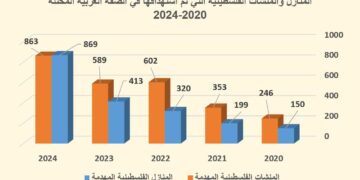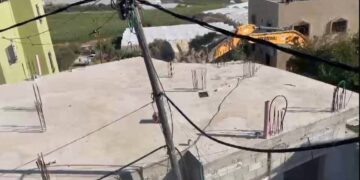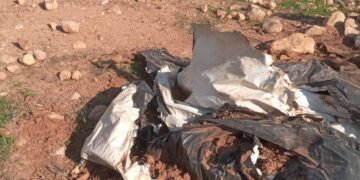Violation: demolition of residences
Location: Al-Halawah hamlet- Masafer Yatta area
Date: October 19, 2017
Perpetrators: Israeli Occupation Forces
Victims: citizens Jamil and Mohammad Abu Iram
Details:
The Israeli occupation authorities demolished on October 19, 2017 two houses claim of "unlicensed construction". Reportedly, the structures are owned by Jamil Younis Abu Iram and Mohammad Ali Abu Iram from Khirbet Al-Halawah in the Yatta area, west Hebron governorate.
According to the village council of Masafer Yatta, a force of the occupation army and the so-called Civil Administration and Border Police accompanied by an army bulldozer and workers relative to an Israeli private company, raided the area in the morning, surrounded the targeted structures and the bulldozer carried out the demolition after the workers extracted some of the houses' interior.
Photo 1-3 : during the demolition operation
Reportedly, Jamil's tin-roofed house was built in 2016. The residence is home for six members including four children.
The affected citizen pointed out that the Israeli occupation authorities notified his residence of demolition on July 05, 2017. Noteworthy, the recently demolished house was given as an aid by GVC aid organization after the owner got his first structure demolished in 2016.
The second structure is a residential tent that was set up in 2016 to be home for a three member family including one child. The 30m2 tent belongs to citizen Mohammad Abu Iram. The affected citizen pointed out that the Israeli occupation authorities notified his residence of demolition on July 05, 2017
It should be noted that the sIsraeli occupation authorities have recently stepped up their attacks against the citizens and their houses in the villages of Masafer Yatta. The Israeli occupation forces closed most of the roads leading to Masafer Yatta. They also closed the roads linking the communities to each other. Therefore, complicated restrictions on movement were imposed on locals on the occupation's claim of "closed military zone no. 918". Such measures are taken to compel citizens to leave the area to facilitate the occupation's control in favor of the settlements and the occupation army camps.
About Al-Halawah:
It is relative to Masafer Yatta area. The hamlet's structures are made of metals slabs and concrete bricks. Al-Halawah is edged by Al-Tawamin and Al-Mfuqara hamlets from the north, Al-Majaz, Al-Tabban and Al-Fakhit hamlets from the east, Al-Markiz , Jinba and Beir Al-Ghawanmeh hamlets from the west and the apartheid wall from the south.
The hamlet's built-up area is 12 dunums, on which nine families (120 members) reside. The area accommodates four tents and six barracks in addition to 22 residential caves.
Al-Halawah has 65 agricultural dunums that are cultivated with barley and wheat.
Kids of the area are obligated to travel 2km to reach their primary school located in the nearby Jinba hamlet where secondary school students have to take a 12km route to reach their school in Yatta town.
Land Research Center LRC sees that demolitions contradict with all the International conventions and Humanitarian laws including:
Article 17 of the (1948) Universal Declaration of Human Rights stating: “Everyone has the right to own property alone as well as in association with others. No one shall be arbitrarily deprived of his property.”
Section ‹G› of article 23 of the (1907) The Hague Conventions asserting: “In addition to the prohibitions provided by special Conventions, it is especially forbidden to destroy or seize the enemy's property, unless such destruction or seizure be imperatively demanded by the necessities of war.”
Article 53 of the Geneva Fourth Convention (1948) declaring: “Any destruction by the Occupying Power of real or personal property belonging individually or collectively to private persons, or to the State, or to other public authorities, or to social or cooperative organizations, is prohibited, except where such destruction is rendered absolutely necessary by military operations.”
Section 1, Article 11 of the International Covenant on Economic, Social and Cultural Rights (1966): “The States Parties to the present Covenant recognize the right of everyone to an adequate standard of living for himself and his family, including adequate food, clothing and housing, and to the continuous improvement of living conditions.
Prepared by:
The Land Research Center
LRC















